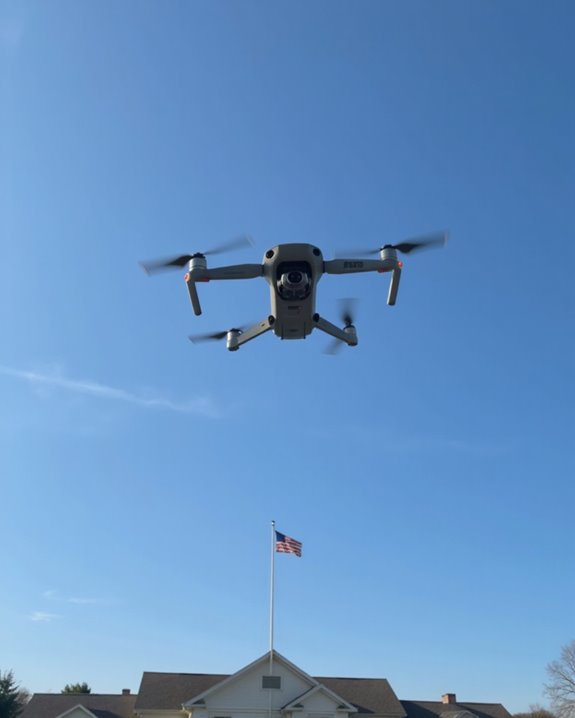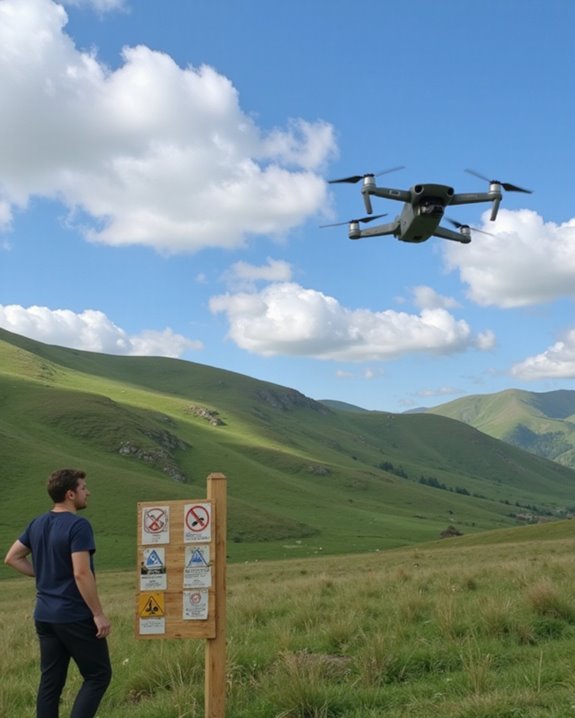Police typically need a warrant to use drones for surveillance on private property where people expect privacy. States like Vermont, Virginia, and Florida have laws requiring warrants with specific exceptions. However, emergencies like active shooters, natural disasters, and search-and-rescue operations don’t require prior approval! Public spaces like parks and streets generally don’t need warrants either. The rules get complicated when determining property boundaries and reasonable privacy expectations. Understanding these nuances can protect your rights in our increasingly aerial-monitored world.
Key Takeaways
- Police generally need warrants for drone surveillance over private residences and fenced areas with reasonable privacy expectations.
- Warrantless drone use is permitted during emergency situations like active shooters, hostage crises, or natural disasters.
- Several states including Vermont, Virginia, Florida, and Illinois require warrants for most police drone operations.
- Public spaces like parks and streets visible from public airspace typically don’t require warrants for drone surveillance.
- Exigent circumstances allow immediate drone deployment without prior approval, but operations are limited to the emergency’s duration.
Fourth Amendment Protections and Drone Surveillance
How exactly does a 230-year-old constitutional amendment apply to technology that didn’t exist until the 21st century? The Fourth Amendment’s Historical Roots in preventing government intrusion into private lives now face a high-tech challenge: police drones hovering over your backyard!
The amendment protects against “unreasonable searches and seizures,” but what’s “unreasonable” when it comes to a tiny, camera-equipped aircraft? Courts distinguish between surveillance in public spaces (generally allowed) versus private areas, where your “reasonable expectation of privacy” matters tremendously.
The Ethical Implications are profound. While drones can help solve crimes and improve public safety, they also risk creating a surveillance state our founding fathers would find horrifying. The challenge now is balancing these new technological capabilities with our centuries-old privacy values—no small feat!
Some modern surveillance drones, like the Potensic ATOM, feature advanced capabilities such as 4K recording with SONY CMOS sensors that heighten the scope and clarity of aerial monitoring.
State-by-State Warrant Requirements for Police Drones
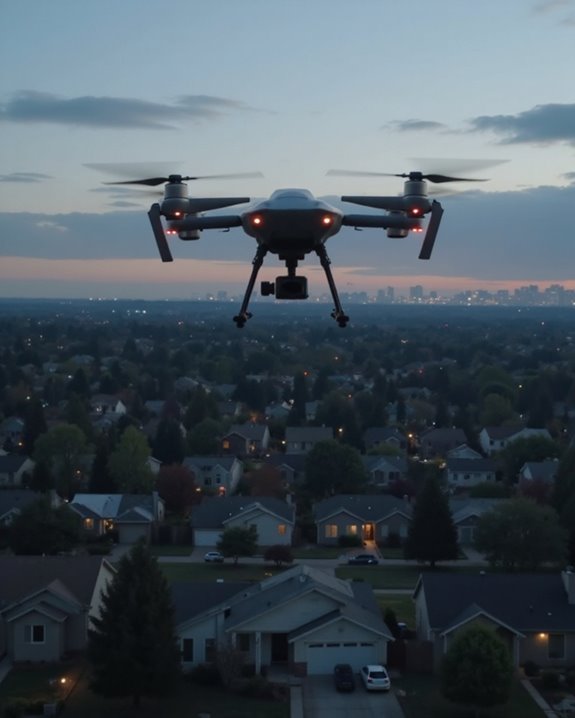
While the Fourth Amendment provides general protections, the specifics of police drone usage actually vary dramatically from state to state—creating a patchwork of regulations across America! The Regulatory Evolution has been fascinating to watch unfold.
States like Vermont, Virginia, Florida, and Illinois have enacted detailed frameworks requiring warrants for most drone surveillance operations. Virginia’s Legislative History shows particular concern for privacy, prohibiting drone use without warrants except during emergencies like Amber Alerts. Florida similarly mandates warrants with specific carve-outs for search and rescue missions—thank goodness for that common sense exception!
Most interesting is how states balance public safety with personal privacy. Washington focuses on registration requirements, while Vermont specifically criminalizes weaponizing drones. The result? Your drone privacy protections depend largely on where you’re standing!
Additionally, while some technologies like RF-blocking products can protect privacy by physically containing signals, legal restrictions prohibit civilians from using active jammer devices, highlighting the complexity of lawful drone signal management.
Emergency Exceptions to Drone Warrant Requirements
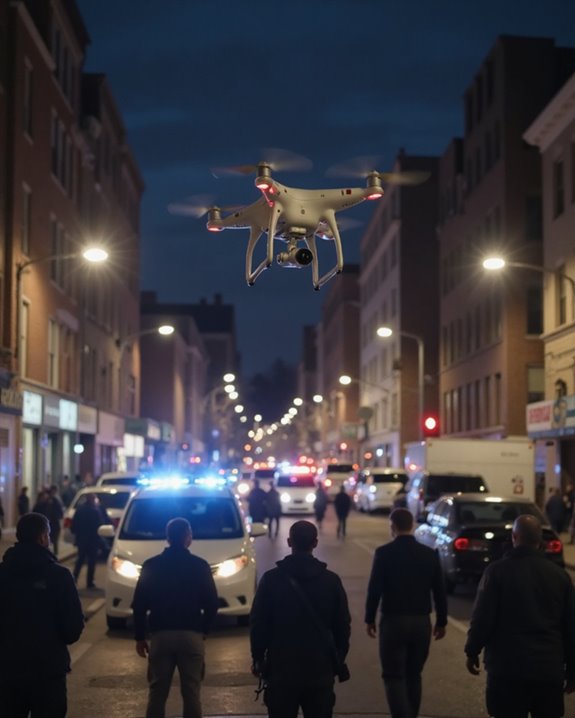
The Fourth Amendment typically requires police to obtain warrants before conducting surveillance, but several critical emergency exceptions exist for drone usage that you should know about! When seconds matter, police can deploy drones immediately for search and rescue operations without waiting for paperwork approval.
During disasters like floods or wildfires, drones become essential tools for Hazard Mitigation, quickly evaluating damage and locating survivors in hard-to-reach areas. They’re also invaluable for Evacuation Support, helping officers identify safe routes and monitor changing conditions. In high-risk situations, such as active shooters or hostage scenarios, these flying cameras provide vital intelligence that could save lives!
While privacy concerns remain valid, courts generally recognize that in true emergencies, the immediate public safety benefit outweighs the warrant requirement. Moreover, contracts with emergency services have expanded opportunities for drones in search and rescue operations, highlighting their growing role in public safety.
Public vs. Private Property: When Warrants Are Needed
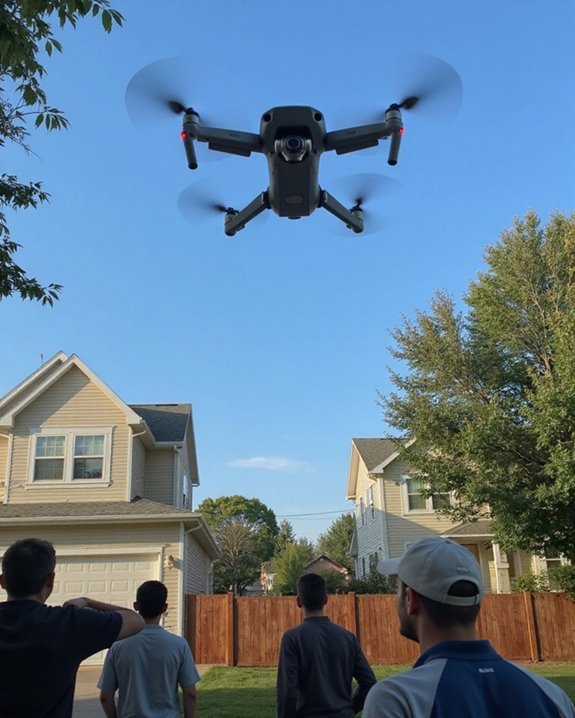
Understanding where police can legally fly drones without a warrant depends critically on property type, creating a fundamental distinction you need to know! When it comes to private residences and fenced yards (the “curtilage”), police typically must obtain a warrant before conducting aerial surveillance. Property zoning plays a significant role here, as areas designated for residential use generally receive stronger Fourth Amendment protections.
In contrast, public spaces like parks, streets, and areas visible from public airspace often don’t require warrants for drone monitoring. Boundary disputes frequently arise in these cases, especially when determining where public property ends and private begins! Remember, your home deserves the highest level of privacy protection, while that community basketball court? Fair game for police drones operating within departmental guidelines and local ordinances.
Recent Court Decisions Shaping Drone Law Enforcement
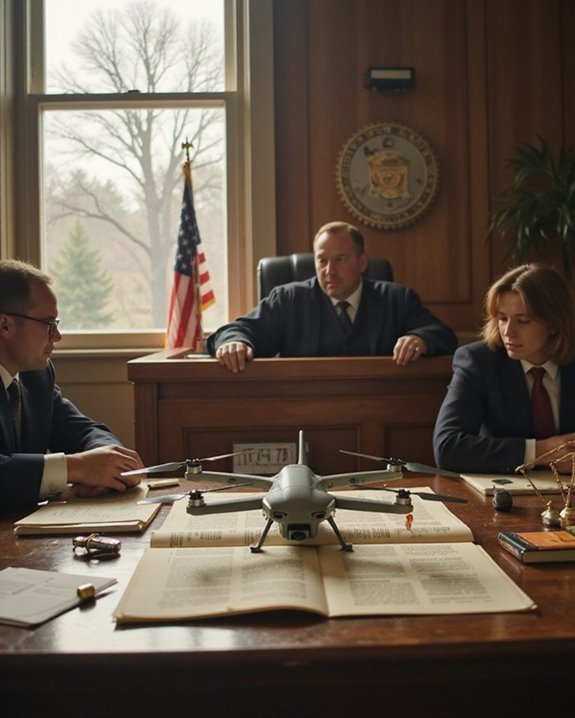
This Judicial Evolution mirrors growing public concern about aerial privacy rights. Courts are increasingly recognizing that drones aren’t simply high-tech toys but powerful surveillance tools requiring proper oversight. While exceptions exist for emergencies (when lives are at stake!), the trend is clear: get a warrant first.
Global Precedents are influencing American courts too, as countries worldwide grapple with similar questions about technology and privacy. Who knew that your backyard barbecue could become a constitutional battleground? The courts certainly did!
Terrorist Threats and Special Circumstances for Warrantless Use
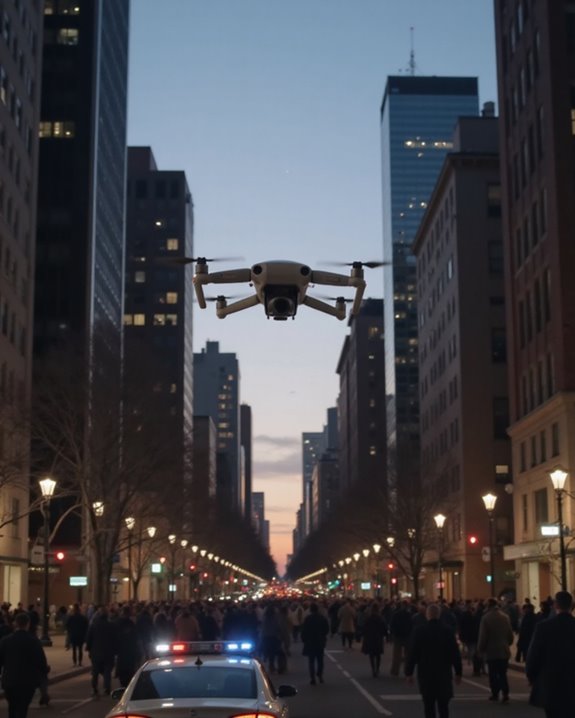
When potential terrorist threats loom over a community, law enforcement’s ability to deploy drones without warrants becomes considerably more nuanced. The emergency exception allows police to bypass normal warrant requirements when immediate action could prevent harm or loss of life. In these high-stakes scenarios, Drone Ethics take a backseat to public safety concerns!
At large events like marathons or rallies, where privacy expectations are diminished, departments can deploy surveillance drones without judicial approval. Notably, the source of technology often matters too — Funding Sources for these high-tech eyes in the sky might determine usage restrictions. Federal grants sometimes come with specific operational guidelines that differ from locally-funded equipment.
Transparency and Accountability in Police Drone Operations
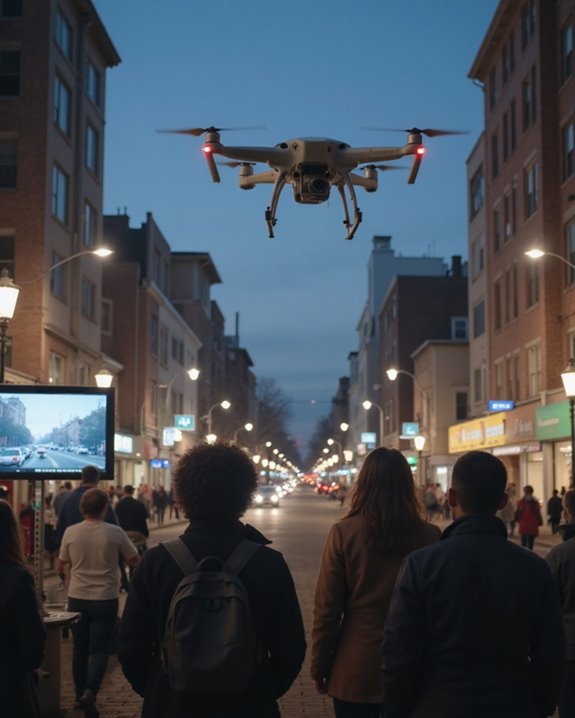
Transparency serves as the cornerstone of public trust when police departments deploy drones over communities! When agencies publish their flight logs and openly disclose their drone capabilities, they build vital relationships with the residents they serve. Many departments have implemented robust Oversight Mechanisms, including regular performance audits and community advisory boards that review drone usage patterns.
Public Disclosure isn’t just good practice—it’s becoming essential as drone programs expand. Think about it: wouldn’t you want to know when and why unmanned aircraft are buzzing above your neighborhood? Smart police departments are getting ahead of concerns by hosting community demonstrations, sharing their drone policies online, and establishing clear guidelines for data collection and storage. These transparency efforts pay dividends when departments need community support for their aerial operations!
Duration Limitations for Emergency Drone Deployments
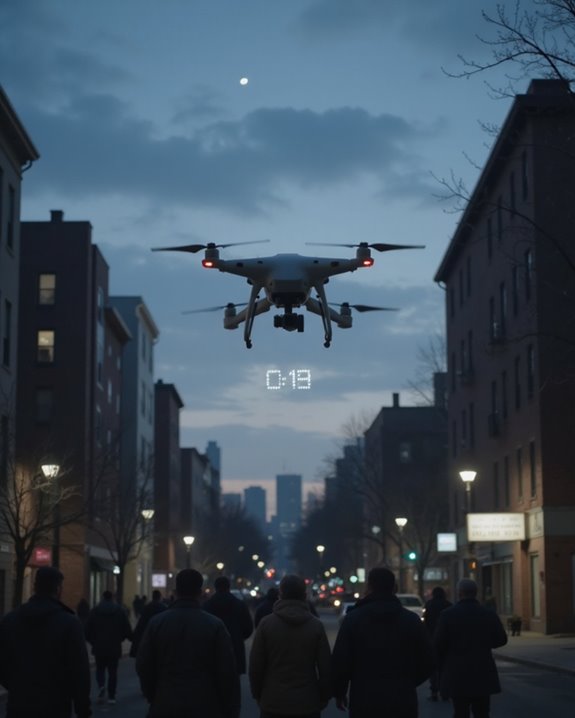
During emergencies, police departments face strict timeframes for deploying drones without traditional warrant requirements! The Deployment Duration for these operations typically follows a 48-hour limit in many jurisdictions, requiring officers to file formal reports within just 24 hours of launch. Think of it as a ticking clock that starts the moment rotors begin spinning!
Time Constraints become particularly critical when officers need to extend surveillance beyond this initial window. For situations requiring longer monitoring, such as complex search and rescue missions or ongoing disaster management, agencies must secure judicial approval through renewable warrants. These limitations create a careful balance between emergency needs and privacy protections, ensuring that even when circumstances demand immediate action, drone operations don’t become indefinite surveillance exercises without proper oversight.
Privacy Expectations in the Age of Aerial Surveillance
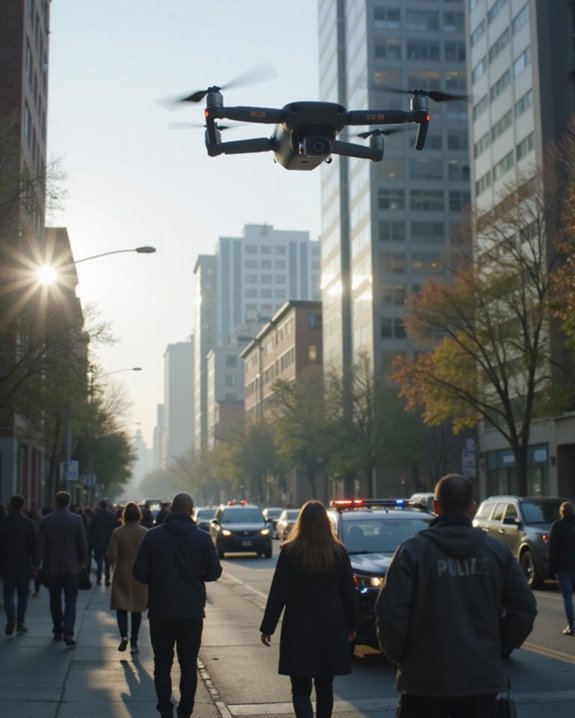
Privacy expectations have fundamentally shifted with the rise of drone technology in law enforcement! The traditional understanding of what constitutes a “reasonable expectation of privacy” is being challenged as drones hover over our neighborhoods and public spaces. Unlike helicopter surveillance of the past, these unmanned aircraft can quietly monitor activities for extended periods, creating tension between Hobbyist Privacy concerns and legitimate policing needs.
Courts are still grappling with where to draw the line – is your backyard barbecue fair game for observation? Many citizens worry about the Environmental Ethics of constant aerial surveillance, from wildlife disruption to noise pollution. While public spaces generally offer reduced privacy protections, the persistent and detailed nature of drone monitoring has many Americans questioning whether this technology demands stricter oversight, even in communal areas!
Law Enforcement Training and Policy Development for Drone Usage
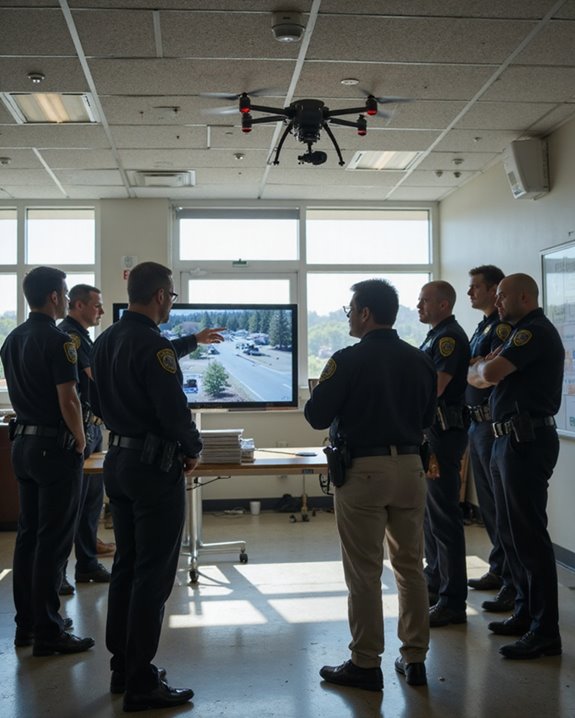
As police departments across America rapidly adopt drone technology, thorough training programs have become the backbone of effective aerial law enforcement! Officers must obtain FAA Part 107 Certification, ensuring they understand federal regulations before taking flight. These Certification Programs cover essential operational skills, from basic navigation to maneuvering in challenging environments.
Skill Enhancement doesn’t stop at flying, though. Officers learn technical aspects of drone mechanics, sensor operation, and data analysis—crucial for turning aerial footage into actionable intelligence. Scenario-based training prepares them for real-world situations like tracking suspects or conducting search and rescue missions.
Many departments are developing thorough policies that address legal frameworks, privacy concerns, and community engagement strategies. With over 1,000 police departments already using drones and more joining every month, these training initiatives are essential for responsible, effective deployment of this game-changing technology!
Frequently Asked Questions
Can Police Use Drones to Monitor International Borders Without Warrants?
Law enforcement agencies can deploy drones along international borders without warrants. This practice raises Border Privacy concerns for residents near boundaries, while limited International Oversight creates inconsistent standards for surveillance operations across different countries.
How Do Weather Conditions Affect the Legality of Police Drone Operations?
Weather conditions greatly impact police drone operations’ legality. Adverse weather affecting visibility and control can violate FAA safety regulations. Storm legality concerns arise when weather impact compromises compliance with operational parameters and evidence collection standards.
Can Footage From Recreational Drones Be Used as Evidence by Police?
Recreational drone footage can serve as evidence if obtained legally with a proper evidence chain established. Police must respect privacy rights, as footage violating these rights may be inadmissible in legal proceedings.
Do Different Drone Models Have Different Legal Restrictions for Police Use?
Different drone models indeed face varying restriction levels for police use. Model compliance requirements are determined by technical capabilities like camera resolution, flight range, and sensor types, with more advanced surveillance features triggering stricter regulations.
Can Police Use Thermal Imaging Drones at Night Without Special Warrants?
Just as night conceals activity, thermal technology reveals it. Police generally require specific thermal warrants for nighttime privacy invasions using heat-detecting drones, following Supreme Court precedent concerning advanced surveillance technologies in residential settings.



